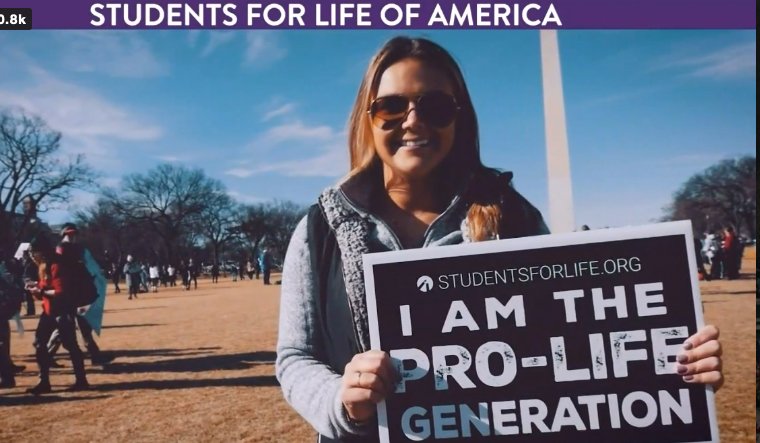
This is a screenshot of a pro-lifer on the National Mall was projected during the virtual March for Life rally in Washington Jan. 29, 2021. (CNS screenshot/March for Life)
WASHINGTON (CNS) — Although the 2021 March for Life was far different from the previous 47 annual marches to protest the Supreme Court’s decision legalizing abortion, organizers and rally speakers stressed that the smaller, and primarily virtual crowd, delivered the very same message.
It was simply “more somber and prayerful,” said Jeanne Mancini, president of the March for Life Defense and Education Fund, in the livestreamed broadcast of a group of pro-life leaders making their way to the Supreme Court after the virtual rally.
“We are symbolically marching,” she said of the group representing those who would have marched in normal circumstances, adding that this was a “unique moment to build a culture of life.”
[hotblock]
The usual in-person march that typically draws crowds by the busloads was already going to be scaled back as many groups canceled their plans to come to Washington during the pandemic.
On Jan. 15, organizers officially announced the event would primarily be virtual, saying that increased security pressures for law enforcement officers around the U.S. Capitol — since the Jan. 6 assault on the Capitol and threats of subsequent violence by domestic terrorist groups — made it impossible to ensure security for march participants.
The message for participants, not muffled by coats, winter gear and crowds moving up and down to stay warm as in previous years, was a resounding cry to continue the fight for the unborn and to advocate for anti-abortion legislation.
The virtual rally was free of usual placards, but it included advertisements from various sponsor groups.
It also did not have the back and forth heated discussions that sometimes occur on the sidewalks or at the Supreme Court with those on both sides of the issue, but snippets of this discussion came up in the comments section for those watching the event on the YouTube link.
The comments section also revealed where many of the viewers were from with comments such as “marching with you” from Louisiana, California and Poland.
The rally began and ended with song and prayer with songs performed by Matthew West, a Christian recording artist and songwriter. The opening prayer was said by Archbishop Joseph F. Naumann of Kansas City, Kansas, chairman of the U.S. bishops’ Committee on Pro-Life Activities, and the closing prayer was said by Cissie Graham Lynch, granddaughter of the well-known Southern Baptist minister, Rev. Billy Graham.
[tower]
The archbishop prayed for God’s blessing on the “pro-life movement in this nation,” and noted that even though its members were separated by distance, they were united by their use of their talents in building a culture of life.
He also prayed for pregnant women and for those who have been “wounded by abortion,” stressing the need to “walk with them in their time of need.”
The rally did not have the usual array of dozens of speakers from Congress but did include a handful of them addressing participants in pretaped messages. Two Democrats were among these speakers: Rep. Angie Hatton of Kentucky, who is the House minority whip, and state Sen. Mike Gabbard of Hawaii.
Hatton said there needs to be a bipartisan effort to end abortion, not just by outlawing the practice but eliminating the need for women to seek abortions by providing better health care, child care, adoption and social services. She said she is asking pro-life Republicans to also work for “pro-babies and moms’ legislation.”
Gabbard urged virtual rallygoers to recognize they are “on a mission together” and to do their best to preserve life “with love and compassion.”
Rep. Chris Smith, R-New Jersey, who is a regular on the stage during March for Life rallies, pointed out that over the years there have been “significant pro-life setbacks — but pro-lifers absolutely refused to quit or go away.” He said that same spirit continues today as the movement faces “enormous challenges.”
Smith directed his comments to President Joe Biden and stressed that the unborn need the president of the United States “to be their friend and advocate, not another powerful adversary.”
Referring to Biden’s remarks at his inauguration that “the dream of justice for all will be deferred no longer,” Smith said those words can only have true meaning if the lives of unborn children are “must be included, and their precious lives must be protected.
Each year many people at the March for Life say they are impressed by the overwhelming youth presence at the march and rally. This year, Elizabeth Eller, student body president at Christendom College, a Catholic college in Front Royal, Virginia, directly addressed younger viewers, urging them to do everything they can for the pro-life movement.
“We can be the generation that sees an end to abortion,” she said.
Tim Tebow, a former professional football quarterback, told his story about how his mother, when she was pregnant with him, had been advised to have an abortion to save her life but she chose not to.
He urged virtual marchers to be willing to “suffer for and with the unborn.”
“We’ve got to do a better job of being all pro-life all the time,” he said. With a pep talk of sorts to the crowd, he added: “This is a hard fight and it might get even harder but stay in it.”
The rally and march, even in a different format, were not meant to be the end of any advocacy work.
As Mancini said in her closing remarks, the fight would continue in other marches to state capitols and in the work every day by people in the pro-life movement.
PREVIOUS: Catholic publication’s Twitter account locked over tweet about Biden nominee
NEXT: Justice for unborn called ‘foundational’ principle of pro-life movement


Share this story